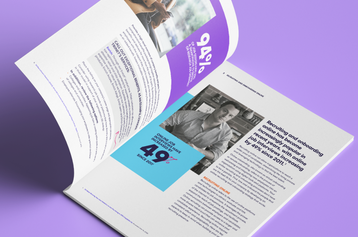
Promoting employees can provide many benefits to an organization, but how does one know when the time is right? And what if someone asks for a promotion that has to be denied? Read on to learn more about the dos and don’ts of promotions.
How Do You Know When It’s Time to Promote?
Do you have an all-star employee ready for a promotion? A good manager understands the importance of career progression. Here are some of the signs to look out for to know when an employee is ready to be promoted.
Whether you’re the founder of a growing company or manager of a small business, knowing when to promote an employee can be tricky.
As younger generations look for growth opportunities alongside meaningful work, the key to keeping a productive and engaged team is promoting properly.
However, figuring out who to promote can be a difficult task, particularly for those new to the process. If you don’t promote often enough, employees can begin to look outside the company for the advancement they seek.
On the other hand, moving someone along too soon can lead to anything from the employee being ineffective in their new role to the mismanagement of others underneath them, which can lead to some serious turnover issues.
The good thing is that it doesn’t take much to understand the basics of promotion. You’ve already taken step one — you’re here reading advice! — so let us map out what you’ll want to consider from here.
The impact on company culture: why promotions matter
As a group of authors points out in the Harvard Business Review after surveying over 400,000 workers across the U.S., how promotions are perceived to be handled at a company can make or break company culture, particularly whether or not employees believe they have a long-term future at their company.
They also found that when employees believe that promotions are handled fairly that they’re more than twice as likely to put in extra effort at their job.
It makes sense: if promotions seem arbitrary or biased and you don’t see yourself as falling under the favor of those in control of your future at a company, are you more likely to stay anyway or will you start looking elsewhere for the career progression you want?
An HR promotion policy: to have one or not to have one?
When it comes to making sure that promotions are fair and equitable rather than the result of biased favoritism that can lead to high turnover in a flash, an HR policy that outlines how promotions are handled at your company and what it takes to get one can be a smart choice to make.
While there is no completely right or wrong way to whip up a promotion policy, there are a few best practices.
First, make sure that promotions are clearly based on skills and performance in order to keep favoritism (and potential lawsuits) at bay.
Next, clarifying the specific criteria for advancement within each role can go a long way to set clear and reasonable expectations around employment. For salespeople, this often comes in the form of sales goals, but all employees can be subject to a time-bound criteria like a requirement of having been at the company for a year or more in order to be considered for a promotion.
Signs that you should be promoting someone
This is one of the easier parts of figuring out when to promote someone. Ideally, they’ll be the one showing you that they’re ready for the additional responsibility. There are a variety of positive signs to look for:
- They’re eager to take on new challenges. One thing is for sure: A new role comes with new challenges, no matter how prepared an employee is. A central skill you’ll want anyone you’re ready to promote to have is the ability to take on the challenges associated with additional responsibilities and be able to handle them rather than be set back by them.
- They’re already performing at a higher level than necessary. One of the best and easiest ways to know that someone is ready for the next level is when they’re already doing it. Of course, you have to be careful about employees consistently working above their pay grade in a way that’s unfair, but if you see someone consistently taking on tasks associated with the next level up in their work, chances are they’re ready for a more permanent change.
- They know what they want next. High achievers are go-getters in their own careers. People ready for a promotion will have already discussed their future with their managers and are able to articulate where they want to progress within the company.
- They have excellent people skills. Especially as you prepare to promote people into management, people skills become incredibly important. One mistake people consistently make is simply promoting people who are good at their jobs into management roles when the real skill that managers need is a high EQ — hard skills can be taught, but people skills are much more of a talent that an employee either has or doesn’t have.
How to go about actually making a promotion
Transparency and equal opportunity are words to live by when considering promotions.
The first thing you’ll want to do is create a job posting for the new role that clearly outlines the requirements and qualifications for the role. This way everyone has a look into what it takes to snag the new job. It also goes a long way to assuage any notions of favoritism as long as you be sure to stick to the criteria during the promotion process. (It’s no use to create criteria for the role if those criteria are going to go out the window when promotion time rolls around.)
Next, it’s time to manage the candidate pipeline. At each stage, whether that’s selecting candidates for an interview or making the final offer, it’s important to provide honest and actionable feedback to any internal applications. This allows them to have a clear picture of what they can do to keep charting towards a promotion even if they didn’t get it this time.
Once you have made your hiring decision, it’s time to put all your effort into ensuring that the person you chose is able to succeed in their new role. Not only will it save you on the cost and time to re-fill the position, but it signals to everyone else at the company who is eyeing a promotion one day that once you get to where you want to go, you’ll be supporting in a new role and beyond.
Overall, think about the promotion process as an opportunity for your employees to look at what it takes to be successful at your company and what they can expect out of it if they stick around for the long run since that’s ultimately the goal, right? Remember: Happy employees mean a happy company.
How to (Gracefully) Deny a Promotion Request
In a perfect world, every manager would be able to reward their team with the promotion they deserve every year. Unfortunately, you may run into cases with your employees where offering a promotion is just not an option. This might be the case because it’s just not in the budget, or, your employee’s performance missed the mark in what is required for them to move up a level.
While sharing the news of a promotion can be exciting, the conversation can be delicate when we are not delivering good news. If you’re going to deny a promotion to an employee, here are a few tips to help you set the stage for a more productive conversation.
Set a proper time and space
Once a decision has been made on the status of an employees promotion, make sure to prioritize getting the news to them quickly so as to not make your employee wait. Chances are, they are already quite anxious to hear back and making them wait will signal a lack of care. Do your best not to postpone this meeting, even if other things come up.
Book a quiet and private meeting with them (virtual for now!) and try to schedule it at the end of the day so that they can take the evening to process.
Prepare for the worst case
While some people may take the news lightly, others will not. This is why it’s important to anticipate and prepare in the following ways:
Have a script ready. Be prepared for an employee expressing dissatisfaction, getting defensive, or potentially tearing up. When we say be prepared, we mean literally write out what you will say, and practice it (but don’t actually bring this script into the meeting)! This will make it easier to be firm and assertive in your delivery when an employee has an emotional response.
Be transparent. Whenever possible, be as transparent as possible and let the employee know exactly why they did not get the promotion. If it was due to budget, performance, or lack of opportunity within the team, let the employee know so that they have clarity of the situation.
Respond with empathy. Of course, these kinds of conversations are hard to deliver and hard to receive. Have empathy, and use phrases like:
- “I know this is not what you expected”
- “I’m sorry that I could not do more for the situation”
- “Know that I value your work and contributions”
This may help soften the blow and show that you really care and that you understand that this is painful!
Don’t make any promises you can’t keep. While you may feel badly and want to please your employee (especially if they are awesome!), avoid making any promises that are not concrete.
For example, you might be inclined to say “unfortunately we could not do a promotion this quarter, but next quarter is looking good.” Unless you know for sure that you can make this happen, promising something that won’t come to fruiting will guarantee disappointment in your employee.
Find alternative ways to help them advance
While you may not be able to provide a promotion, you can still help your employee improve their performance and advance their career in the following ways:
Providing honest feedback. Feedback, when done constructively, can really help an employee identify blind spots and understand their strengths. Rather than giving brief feedback saying they are doing well in one area, and need improvement in another, give them specific feedback using the Situation-Behavior-Impact model. This will help them develop better insights into their own performance.
Stretch opportunities. While you may not be able to help your employee with a promotion, you can help them develop their skills through stretch opportunities. This will help also keep them engaged as they will be busy with new kinds of work.
Create a career plan. To help them feel like they are still on track with their career, help them create a career plan. This can include things like career goals, skills they want to develop, and finally training and development to help them get there. Check out this guide from Google to help you.
Accept the negative consequences
Unfortunately, there is always a chance that not being able to provide your high performers a promotion will cause them to disengage and jump ship. This is something to watch out for because if one of your employees starts demonstrating disengagement, it can poison the well and spread to your other employees.
People may feel burned in these moments, so be sure to spend extra time recognizing and rewarding your team in as many ways as possible. Create an intentional space to connect and show them you care.






